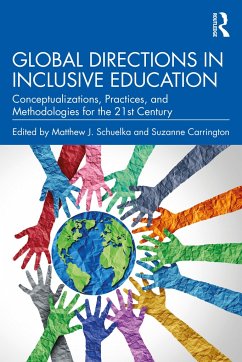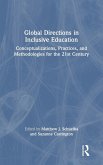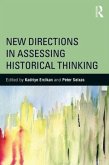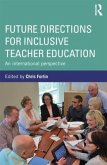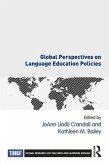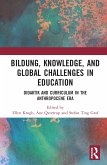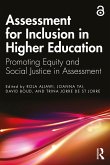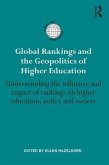Global Directions in Inclusive Education
Conceptualizations, Practices, and Methodologies for the 21st Century
Herausgeber: Carrington, Suzanne; Schuelka, Matthew J.
Global Directions in Inclusive Education
Conceptualizations, Practices, and Methodologies for the 21st Century
Herausgeber: Carrington, Suzanne; Schuelka, Matthew J.
- Broschiertes Buch
- Merkliste
- Auf die Merkliste
- Bewerten Bewerten
- Teilen
- Produkt teilen
- Produkterinnerung
- Produkterinnerung
This book considers fresh international perspectives on schooling culture, systems, teacher preparation, school leadership and policy. The expert contributors push the conceptual boundaries of à â Ë inclusive educationà â â and explore new ways to research and conceptualize inclusion and diversity in education for all children.
Andere Kunden interessierten sich auch für
![Global Directions in Inclusive Education Global Directions in Inclusive Education]() Global Directions in Inclusive Education201,99 €
Global Directions in Inclusive Education201,99 €![New Directions in Assessing Historical Thinking New Directions in Assessing Historical Thinking]() New Directions in Assessing Historical Thinking78,99 €
New Directions in Assessing Historical Thinking78,99 €![Future Directions for Inclusive Teacher Education Future Directions for Inclusive Teacher Education]() Future Directions for Inclusive Teacher Education43,99 €
Future Directions for Inclusive Teacher Education43,99 €![Global Perspectives on Language Education Policies Global Perspectives on Language Education Policies]() Global Perspectives on Language Education Policies71,99 €
Global Perspectives on Language Education Policies71,99 €![Bildung, Knowledge, and Global Challenges in Education Bildung, Knowledge, and Global Challenges in Education]() Bildung, Knowledge, and Global Challenges in Education199,99 €
Bildung, Knowledge, and Global Challenges in Education199,99 €![Assessment for Inclusion in Higher Education Assessment for Inclusion in Higher Education]() Assessment for Inclusion in Higher Education53,99 €
Assessment for Inclusion in Higher Education53,99 €![Global Rankings and the Geopolitics of Higher Education Global Rankings and the Geopolitics of Higher Education]() Global Rankings and the Geopolitics of Higher Education234,99 €
Global Rankings and the Geopolitics of Higher Education234,99 €-
-
-
This book considers fresh international perspectives on schooling culture, systems, teacher preparation, school leadership and policy. The expert contributors push the conceptual boundaries of à â Ë inclusive educationà â â and explore new ways to research and conceptualize inclusion and diversity in education for all children.
Hinweis: Dieser Artikel kann nur an eine deutsche Lieferadresse ausgeliefert werden.
Hinweis: Dieser Artikel kann nur an eine deutsche Lieferadresse ausgeliefert werden.
Produktdetails
- Produktdetails
- Verlag: Taylor & Francis Ltd
- Seitenzahl: 338
- Erscheinungstermin: 17. Dezember 2021
- Englisch
- Abmessung: 234mm x 156mm x 18mm
- Gewicht: 512g
- ISBN-13: 9780367550936
- ISBN-10: 0367550938
- Artikelnr.: 62715628
- Herstellerkennzeichnung
- Books on Demand GmbH
- In de Tarpen 42
- 22848 Norderstedt
- info@bod.de
- 040 53433511
- Verlag: Taylor & Francis Ltd
- Seitenzahl: 338
- Erscheinungstermin: 17. Dezember 2021
- Englisch
- Abmessung: 234mm x 156mm x 18mm
- Gewicht: 512g
- ISBN-13: 9780367550936
- ISBN-10: 0367550938
- Artikelnr.: 62715628
- Herstellerkennzeichnung
- Books on Demand GmbH
- In de Tarpen 42
- 22848 Norderstedt
- info@bod.de
- 040 53433511
Matthew J. Schuelka is a researcher at the Institute on Community Integration and lecturer in the College of Education and Human Development at the University of Minnesota, USA. He is also the founder and CEO of Fora Education. Suzanne Carrington is a Professor in The Centre for Inclusive Education (C4IE) and a member of the Faculty of Creative Industries, Education and Social Justice, Queensland University of Technology, Australia.
Table of Contents
1. Innovative and global directions for inclusive education in the 21st
century - Matthew J. Schuelka and Suzanne Carrington
Part I: Conceptual Innovation
2. International perspectives on inclusive education in rural contexts:
Finding (un)common ground - Julie Dillon-Wallace
3. Beginning with language: Inclusive education strategies with sign
languages in Rwanda, Singapore, United States, and Vi¿t Nam - Audrey
Cooper, Sonia Holzman, Maegan Shanks, and Phoebe Tay
4. Affects and materiality in Santiago de Chile's schools: The
importance of relationality in the co-enactment of inclusion -
Rosario Palacios
5. Conceptualising inclusion within Indonesian contexts - Nur Azizah,
Elga Andriana, and David Evans
6. Is inclusive education enough for Australian Aboriginal students?
Making the case for belonging education to disrupt the normalised
agenda of assimilation - Sheelagh Daniels-Mayes, Gary Fry, and Karen
Sinclair
Part II: Pragmatic Innovation
7. Visibly rewarding learners for academic achievement: The guise of
excellence - Shakira Akabor
8. Diagnosis, integration, and inclusion: The experiences of schools and
families in Cambodian policy and practice - Anne E. Crylen
9. Talking about self: Exploring the potential of teacher's talk in
professional learning communities for inclusive pedagogy - Wacango
Kimani
10. Localizing a universal claim: Applying universal design strategies to
support inclusion in Armenia - Armenuhi Avagyan, Christopher
Johnstone, Ofelia Asatryan, Lilia Khachatryan, and Aleksandr
Shagafyan
11. Critical reflexivity as a pedagogy for inclusivity in teacher
education - Levan Lim and Thana Thaver
12. Re-turning insights on belonging: An international collaboration
between Flanders and New Zealand - Hanne Vandenbussche, Elisabeth De
Schauwer, Evelyn Christina, Missy Morton, and Geert Van Hove
Part III: Methodological Innovation
13. Being seen and heard: Using Photovoice methodology in inclusive
education research - Alisha M.B. Braun
14. Collaborative B-learning as a tool to studying and preparing for
inclusion in a culturally diverse environment - Silvia
Romero-Conteras, Ismael Garcia-Cedillo, and Gabriela Silva-Maceda
15. Into the mesa: A case study of Jordanian inclusion policy - Sarah K.
Benson
16. Becoming an activist: A story of parental advocacy for inclusive
education - Glenys Mann and the Queensland Collective for Inclusive
Education
17. Exploring the congruence between Bhutanese teachers' views about
inclusion, Gross National Happiness, and Buddhism - Dawa Dukpa,
Suzanne Carrington, Sofia Mavropoulou, and Matthew J. Schuelka
1. Innovative and global directions for inclusive education in the 21st
century - Matthew J. Schuelka and Suzanne Carrington
Part I: Conceptual Innovation
2. International perspectives on inclusive education in rural contexts:
Finding (un)common ground - Julie Dillon-Wallace
3. Beginning with language: Inclusive education strategies with sign
languages in Rwanda, Singapore, United States, and Vi¿t Nam - Audrey
Cooper, Sonia Holzman, Maegan Shanks, and Phoebe Tay
4. Affects and materiality in Santiago de Chile's schools: The
importance of relationality in the co-enactment of inclusion -
Rosario Palacios
5. Conceptualising inclusion within Indonesian contexts - Nur Azizah,
Elga Andriana, and David Evans
6. Is inclusive education enough for Australian Aboriginal students?
Making the case for belonging education to disrupt the normalised
agenda of assimilation - Sheelagh Daniels-Mayes, Gary Fry, and Karen
Sinclair
Part II: Pragmatic Innovation
7. Visibly rewarding learners for academic achievement: The guise of
excellence - Shakira Akabor
8. Diagnosis, integration, and inclusion: The experiences of schools and
families in Cambodian policy and practice - Anne E. Crylen
9. Talking about self: Exploring the potential of teacher's talk in
professional learning communities for inclusive pedagogy - Wacango
Kimani
10. Localizing a universal claim: Applying universal design strategies to
support inclusion in Armenia - Armenuhi Avagyan, Christopher
Johnstone, Ofelia Asatryan, Lilia Khachatryan, and Aleksandr
Shagafyan
11. Critical reflexivity as a pedagogy for inclusivity in teacher
education - Levan Lim and Thana Thaver
12. Re-turning insights on belonging: An international collaboration
between Flanders and New Zealand - Hanne Vandenbussche, Elisabeth De
Schauwer, Evelyn Christina, Missy Morton, and Geert Van Hove
Part III: Methodological Innovation
13. Being seen and heard: Using Photovoice methodology in inclusive
education research - Alisha M.B. Braun
14. Collaborative B-learning as a tool to studying and preparing for
inclusion in a culturally diverse environment - Silvia
Romero-Conteras, Ismael Garcia-Cedillo, and Gabriela Silva-Maceda
15. Into the mesa: A case study of Jordanian inclusion policy - Sarah K.
Benson
16. Becoming an activist: A story of parental advocacy for inclusive
education - Glenys Mann and the Queensland Collective for Inclusive
Education
17. Exploring the congruence between Bhutanese teachers' views about
inclusion, Gross National Happiness, and Buddhism - Dawa Dukpa,
Suzanne Carrington, Sofia Mavropoulou, and Matthew J. Schuelka
Table of Contents
1. Innovative and global directions for inclusive education in the 21st
century - Matthew J. Schuelka and Suzanne Carrington
Part I: Conceptual Innovation
2. International perspectives on inclusive education in rural contexts:
Finding (un)common ground - Julie Dillon-Wallace
3. Beginning with language: Inclusive education strategies with sign
languages in Rwanda, Singapore, United States, and Vi¿t Nam - Audrey
Cooper, Sonia Holzman, Maegan Shanks, and Phoebe Tay
4. Affects and materiality in Santiago de Chile's schools: The
importance of relationality in the co-enactment of inclusion -
Rosario Palacios
5. Conceptualising inclusion within Indonesian contexts - Nur Azizah,
Elga Andriana, and David Evans
6. Is inclusive education enough for Australian Aboriginal students?
Making the case for belonging education to disrupt the normalised
agenda of assimilation - Sheelagh Daniels-Mayes, Gary Fry, and Karen
Sinclair
Part II: Pragmatic Innovation
7. Visibly rewarding learners for academic achievement: The guise of
excellence - Shakira Akabor
8. Diagnosis, integration, and inclusion: The experiences of schools and
families in Cambodian policy and practice - Anne E. Crylen
9. Talking about self: Exploring the potential of teacher's talk in
professional learning communities for inclusive pedagogy - Wacango
Kimani
10. Localizing a universal claim: Applying universal design strategies to
support inclusion in Armenia - Armenuhi Avagyan, Christopher
Johnstone, Ofelia Asatryan, Lilia Khachatryan, and Aleksandr
Shagafyan
11. Critical reflexivity as a pedagogy for inclusivity in teacher
education - Levan Lim and Thana Thaver
12. Re-turning insights on belonging: An international collaboration
between Flanders and New Zealand - Hanne Vandenbussche, Elisabeth De
Schauwer, Evelyn Christina, Missy Morton, and Geert Van Hove
Part III: Methodological Innovation
13. Being seen and heard: Using Photovoice methodology in inclusive
education research - Alisha M.B. Braun
14. Collaborative B-learning as a tool to studying and preparing for
inclusion in a culturally diverse environment - Silvia
Romero-Conteras, Ismael Garcia-Cedillo, and Gabriela Silva-Maceda
15. Into the mesa: A case study of Jordanian inclusion policy - Sarah K.
Benson
16. Becoming an activist: A story of parental advocacy for inclusive
education - Glenys Mann and the Queensland Collective for Inclusive
Education
17. Exploring the congruence between Bhutanese teachers' views about
inclusion, Gross National Happiness, and Buddhism - Dawa Dukpa,
Suzanne Carrington, Sofia Mavropoulou, and Matthew J. Schuelka
1. Innovative and global directions for inclusive education in the 21st
century - Matthew J. Schuelka and Suzanne Carrington
Part I: Conceptual Innovation
2. International perspectives on inclusive education in rural contexts:
Finding (un)common ground - Julie Dillon-Wallace
3. Beginning with language: Inclusive education strategies with sign
languages in Rwanda, Singapore, United States, and Vi¿t Nam - Audrey
Cooper, Sonia Holzman, Maegan Shanks, and Phoebe Tay
4. Affects and materiality in Santiago de Chile's schools: The
importance of relationality in the co-enactment of inclusion -
Rosario Palacios
5. Conceptualising inclusion within Indonesian contexts - Nur Azizah,
Elga Andriana, and David Evans
6. Is inclusive education enough for Australian Aboriginal students?
Making the case for belonging education to disrupt the normalised
agenda of assimilation - Sheelagh Daniels-Mayes, Gary Fry, and Karen
Sinclair
Part II: Pragmatic Innovation
7. Visibly rewarding learners for academic achievement: The guise of
excellence - Shakira Akabor
8. Diagnosis, integration, and inclusion: The experiences of schools and
families in Cambodian policy and practice - Anne E. Crylen
9. Talking about self: Exploring the potential of teacher's talk in
professional learning communities for inclusive pedagogy - Wacango
Kimani
10. Localizing a universal claim: Applying universal design strategies to
support inclusion in Armenia - Armenuhi Avagyan, Christopher
Johnstone, Ofelia Asatryan, Lilia Khachatryan, and Aleksandr
Shagafyan
11. Critical reflexivity as a pedagogy for inclusivity in teacher
education - Levan Lim and Thana Thaver
12. Re-turning insights on belonging: An international collaboration
between Flanders and New Zealand - Hanne Vandenbussche, Elisabeth De
Schauwer, Evelyn Christina, Missy Morton, and Geert Van Hove
Part III: Methodological Innovation
13. Being seen and heard: Using Photovoice methodology in inclusive
education research - Alisha M.B. Braun
14. Collaborative B-learning as a tool to studying and preparing for
inclusion in a culturally diverse environment - Silvia
Romero-Conteras, Ismael Garcia-Cedillo, and Gabriela Silva-Maceda
15. Into the mesa: A case study of Jordanian inclusion policy - Sarah K.
Benson
16. Becoming an activist: A story of parental advocacy for inclusive
education - Glenys Mann and the Queensland Collective for Inclusive
Education
17. Exploring the congruence between Bhutanese teachers' views about
inclusion, Gross National Happiness, and Buddhism - Dawa Dukpa,
Suzanne Carrington, Sofia Mavropoulou, and Matthew J. Schuelka

